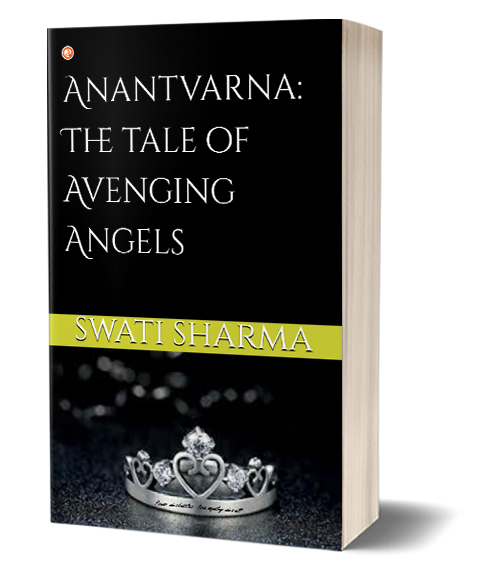- October 25, 2025
Swati Sharma Talks About Her Book “Anantvarna”

About the Author:
Swati is a software professional with an enduring passion for storytelling. Drawing inspiration from everyday life, her writing delves deep into human emotions, relationships, and the intricate ways people respond to the world around them. Through her words, she seeks to connect with readers on a personal level, exploring the subtleties that shape our choices and define who we are.
Exclusive interview with the author
Q: What Inspired You To Write This Book?
A: I have always been fascinated by how human beings react to situations—not just based on logic, but often driven by their prejudices, past experiences, and hidden fears. These subtle influences shape their choices, and eventually their destiny. With Anantvarna, I wanted to capture that complexity—how a single moment, a decision, or even a bias can ripple through a person’s life and the lives around them. The story became a canvas for me to explore fate, free will, and the invisible threads that tie human emotions together.
Q: Can You Tell Us About The Book?
A: Anantvarna: The Tale of Avenging Angels is a story that delves into the timeless conflict between destiny and free will, wrapped in a world of myth, power, and human frailties. At its heart, it follows the journey of those who rise as “avenging angels”—individuals burdened by their past and driven by a fierce sense of justice, revenge, or redemption. The book explores how prejudices, hidden scars, and choices made in moments of desperation can shape not only a person’s fate but also alter the course of kingdoms and generations. Each character carries within them shades of light and darkness, making the line between savior and destroyer often blurred. Through layered storytelling, Anantvarna questions whether vengeance can ever lead to true justice, and whether destiny is a path laid out for us—or one we carve through the weight of our decisions. It is both a tale of struggle and transformation, where angels are not flawless beings, but reflections of our own complexities.
Q: What Does The Title Mean?
A: The title Anantvarna comes from Hindi and Sanskrit, and I’ve used it to mean “infinitely diverse and inclusive.” It’s also the name of the central place where the story unfolds—a realm that reflects the vastness of human emotions, conflicts, and possibilities. The subtitle, The Tale of Avenging Angels, captures the essence of the story: it’s about people who believe they were wronged and how their pursuit of revenge shapes their journeys, blurring the lines between justice, vengeance, and destiny.
Q: What Did You Learn When Writing The Book?
A: What I learned while writing Anantvarna is that it’s never as simple as having a story or an idea and just putting it down on paper. The story grows with you—it evolves daily, often taking unexpected paths you hadn’t imagined at the beginning. That unpredictability was both challenging and enriching. Writing, especially in this genre of fiction, feels like living with people who are very close to you. The characters become companions—you feel them, you talk to them, and at times they even surprise you with what they want to do. That process taught me patience, openness, and the humility to let the story unfold on its own terms rather than forcing it into a fixed mold.
Q: Where Do You Get Your Information Or Ideas For Your Books?
A: I’ve been blogging and writing poetry for quite some time, so storytelling has always been a part of how I express myself. My ideas usually come from daily observations—the way people behave, the choices they make, and the complexities that shape those choices. Human behavior fascinates me because it’s never simple; it’s layered with emotions, prejudices, and experiences. Anantvarna grew out of those reflections. Instead of drawing from research or external sources, I often look inward and around me—at the subtle ways people interact with life. That’s where the seeds of my stories come from.
Q: Do You Try More To Be Original Or To Deliver To Readers What They Want?
A: For me, originality always comes first. Writing, at its core, has to be honest—if I try too hard to deliver only what readers expect, it risks losing authenticity. That said, I do believe originality and reader engagement are not opposites. When you write with depth—especially with layered characters and meaningful conflicts—readers naturally find their own connection to it. So I try to strike a balance: staying true to my voice and the story I want to tell, while ensuring it remains accessible and engaging for readers.
Q: What Is The Most Difficult Part About Writing For You?
A: For me, the most difficult part is maintaining the right pacing. I often get so absorbed in one emotion, a character’s state of mind, or a particular scene that I risk slowing the flow of the story. Balancing emotional depth with narrative momentum is always a challenge. Another difficulty is knowing when to stop refining. As a writer, you constantly feel the story could be polished more, but at some point you have to let go and allow it to live with the readers. For me, striking that balance—between depth and pace, between perfection and completion—is the hardest part of writing.
Q: What Does Success Mean To You? What Is The Definition Of Success?
A: For me, success is about contentment and happiness in the process—being present and appreciating the moment rather than constantly chasing what might come next. It’s about remembering what truly matters and practicing gratitude for what you’ve achieved, without letting its value fade over time or taking it for granted. In essence, success isn’t just an outcome or milestone—it’s a mindset, a way of living fully and appreciating both the journey and the accomplishments along the way.
Q: How Important Is Research To You When Writing A Book
A: Research is very important, especially when a story involves history, specific places, or distinct cultures. It ensures authenticity and depth, helping the narrative feel real and credible. At the same time, thorough research helps avoid unintentional biases, allowing the story and its characters to be portrayed fairly and accurately. Even in fiction, where imagination drives the plot, research grounds the world-building and makes the reader’s experience more immersive.
Q: Where Do You Get Your Greatest Ideas For Writing?
A: It may sound repetitive, but my greatest ideas come from social observation. Watching how people interact, how they react to situations, and the subtle complexities in everyday life gives me endless inspiration. Human behavior—its contradictions, emotions, and choices—is endlessly fascinating, and it naturally seeps into my stories. Even in fiction or poetry, the seeds of my ideas are rooted in real-life observations and experiences, giving the stories authenticity and depth.
This book is published by OrangeBooks Publication. All rights are reserved with the author & the publisher.














